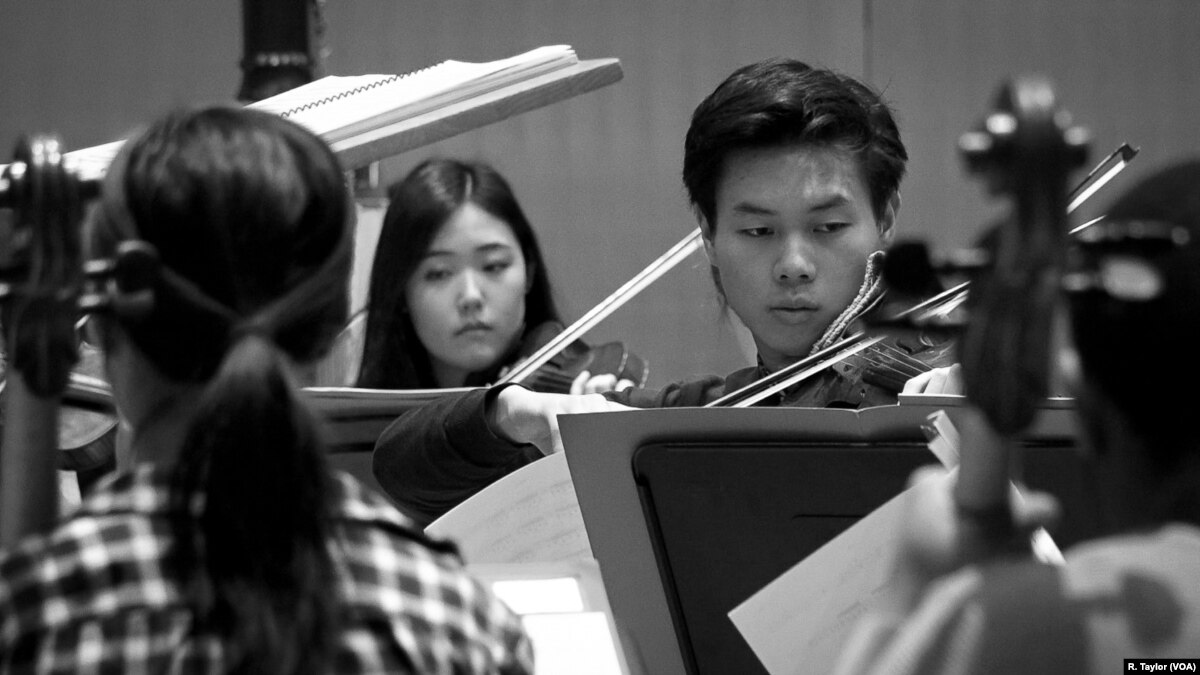
Seated before the Juilliard music school’s diverse student orchestra, atop a square platform, guest conductor Chen Lin commands perfection with her fingers, mouth and eyes. She stares at her music sheet, and up again, with intent and nuance.
She communicates by holding her breath, her resolve more steady than anyone else’s in the room — apart from composer Chen Qigang, who stands behind her during rehearsal.
The conductor-composer duo is a small sample of Juilliard’s Chinese-themed Focus! Festival, titled “China Today” — an orchestral display of contemporary composition, featuring minimal traditional Chinese instruments.
For the Manhattan concertgoer, orchestral student or occasional listener, the finer points of composition separating East and West may be muddy if not for instruments like the erhu — an ancient two-stringed bowed instrument. It was the only traditional instrument featured in Friday’s closing night concert, in a composition titled “Wild Grass” by Guo Wenjing.
Even the most trained ears, like Joel Sachs’, conductor and professor of music history at Juilliard, cannot distinguish all that is Chinese.
“I can recognize some Chinese elements pretty well, especially the ones related to the tones of speech. But there are other things that we are not so familiar [with] because we don’t hear enough of it,” said Sachs, who also directs the annual Focus! Festival.
An example from the festival’s opening night concert was brought to his attention by a Chinese student-member of the New Juilliard Ensemble, who noted certain “rhythmic figures” by composer Liu Sola, one of China’s first rock ’n’ roll stars in the years following Mao Zedong’s Cultural Revolution.
Another phenomenon, Sachs notes — among the festival’s Chinese composers and in Chinese music more broadly — is the use of nature images as a starting point for their compositions.
But the difficulty in identifying the origin of a piece, Sachs explains, can be directed much further back in time, before modern-era cultural and economic globalization.
“I think if one knew a lot about the music of the late-18th century and you listen to certain (nonoperatic) works by Mozart, and not know who he was, you’d think he was an Italian composer,” Sachs said. “Yet on other occasions, if you look at Mozart, you’re sure he speaks German.
“These days, it’s really hard to tell, and sometimes, it’s because of our ignorance,” Sachs said.
WATCH: At Juilliard Festival, a Challenge to Western Preconceptions of Chinese Composition
‘Preconceived opinions’
Chen Lin, guest conductor of the festival’s closing night concert and professor at the Central Conservatory of Music in Beijing, says it’s difficult for her to classify her own style by nationality, given her repertoire, which includes a U.S. professor appointment at the University of Cincinnati College-Conservatory of Music.
“It’s a question that I’ve been asking myself throughout the years,” Chen said, “because when people look at the profession of conducting or conductors, they usually have their own preconceived opinions…”
But bigger than the question of “Chinese or American” for Chen is an obstacle of gender, one she has faced everywhere, but which she says is more pronounced in Chinese culture.
“[People] would usually put the word ‘female’ when referencing me as a conductor,” Chen said. “But to me personally, music should not be described by gender.”
For this year’s Focus! Festival, Chen conducted three works by influential contemporary Chinese composers Chen Qigang, Guo Wenjing and the late Zhu Jian-Er — a “wonderful opportunity,” she said, “to use a Western musical structure, such as an orchestra, infused with Chinese musical elements.”
At the end of the 34th festival, director Sachs describes this and each year’s endeavor — in planning and execution — as a process of discovery.
“It’s the pleasure of seeing people suddenly realize that there’s more music that they ever imagined existed in the world, and that it’s kind of endless,” Sachs said. “If you’re willing to explore, you never get bored.”
Read More At Juilliard Festival, a Challenge to Western Preconceptions of Chinese Composition : http://ift.tt/2rNHYrY
No comments:
Post a Comment